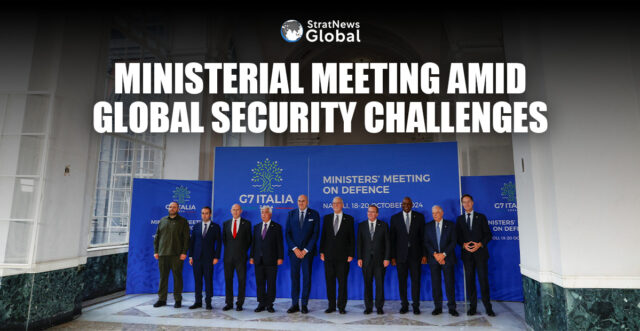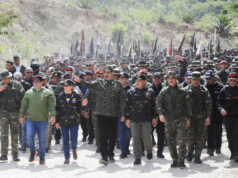Defence ministers of the Group of Seven (G7) wealthy democracies kicked off their meeting on Saturday.
The host country Italy has warned that the global security framework is growing increasingly precarious due to competing visions of the world.
The G7 gathering marks the group’s first ministerial meeting dedicated to defence and comes a few days after Israeli forces killed Hamas leader Yahya Sinwar.
Some Western leaders said that Sinwar’s death raised the chances of an end to the conflict in Gaza.
Italy holds the G7 rotating presidency for 2024 as the West also grapples with the Russian advance in Ukraine and China’s military activities around Taiwan, as well as heightened tensions along the border of North and South Korea.
“The brutal Russian aggressions in Ukraine and the indeed critical situation in Middle East, combined with the profound instability of sub-Saharan Africa and the increasing tension in the Indo-Pacific region, highlight a deteriorated security framework,” Italian Defence Minister Guido Crosetto said in his opening speech.
Italian officials said Ukrainian Defence Minister Rustem Umerov had joined colleagues in the southern Italian city of Naples, where a discussion on developments in his country is expected.
Crosetto – a prominent member of Prime Minister Giorgia Meloni’s Brothers of Italy party, warned that near term forecasts for global security “cannot be positive”
He said that tensions were fuelled by a confrontation between “two different, perhaps
incompatible visions of the world.”
On the one side are the countries and organizations that believe in a world order based on international law, while “on the other side, (there are) those who systematically disrespect democracy to pursue their objectives, including by a deliberate use of military force.”
Before the meeting, Crosetto welcomed photographers holding a model of a tiny red animal horn, a symbol of good luck according to time-honoured Neapolitan tradition.
Besides Italy, the G7 includes the United States, Canada, Britain, France, Germany and Japan.
Representatives of the European Union and NATO representatives are also attending the gathering in the southern Italian city.
The EU’s chief diplomat Josep Borrell appealed for a ceasefire in Gaza and Lebanon and the freeing of the Israeli hostages still held by Hamas.
Borrell said that Sinwar’s death should be seized as an opportunity for the cessation of hostilities.
He also urged respect for the U.N. peacekeepers in Lebanon, which were recently targeted by Israel.
He told reporters that the morning session mainly focused on the Middle East, and said the U.N. mission in Lebanon, known as UNIFIL, could be reviewed but it would be up to the U.N. Security Council to make decisions on its future.
“Some of the members of this (G7) meeting are important members of the Security Council too,” Borrell said.
Italy is a major contributor to UNIFIL which is stationed in southern Lebanon to monitor hostilities along the demarcation line with Israel.
Israeli attacks have angered Prime Minister Giorgia Meloni, who visited Lebanon and Jordan on Friday.
(With inputs from Reuters)
Delhi based journalist pickled in journalism. Have reported from nine world capitals and almost all parts of India. Over the last three decades, I have worked for India’s mainstream English dailies and contributed to All India Radio, Doordarshan and Women’s Feature Service. Also worked for international media including Japan’s leading newspaper, The Asahi Shimbun and done assignments for The Sunday Times, London, The Telegraph, The Guardian and the Canadian Broadcasting Corporation. Worked in the Embassy of France in New Delhi and can speak French to save my life. Write on Diplomacy, Politics and the social sector. Love Nature, heritage, Nature, animals and vintage cars. Enjoy cycling and playing badminton.





